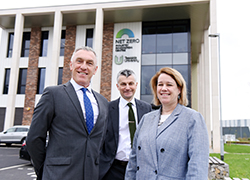Far right turning to the internet to spread anti-Muslim hate online
A new report shows that three quarters of anti-Muslim hate crimes reported to a monitoring organisation are taking place online – with the English Defence League highlighted as the far-right group implicated in the majority of internet attacks.
The report, by Professor Nigel Copsey from Teesside University, also reveals a surge in anti-Muslim attacks since the murder of Drummer Lee Rigby in Woolwich, rising from an average of 1.5 reported incidents a day, to 6 to 7 reported incidents.
Professor Copsey will present the findings from his report at a two day international conference taking place on 4-5 July to mark the official launch of Teesside University’s Centre for Fascist, Anti-Fascist and Post-Fascist Studies.
The ground-breaking Centre, part of the School of Arts & Media, is the first research unit in Britain dedicated to the study of the far right and its opposition.
The launch will see a two day conference held at the University’s Darlington campus titled ‘Fascist Ideologies Past and Present’ and will feature a range of internationally renowned researchers; examining issues such as the historical impact of key radical right figures, metapolitics and white power music.
Professor Copsey’s report is based on data from the Tell MAMA (Measuring Anti-Muslim Attacks) project set up in 2012 by Faith Matters. It primarily covers a period from 1 April 2012 to 30 April 2013, with additional data complied post-Woolwich.
It shows that from 1 April 2012 to 30 April 2013, there were 584 recorded incidents of anti-Muslim hate crimes, though around two thirds of these incidents were not reported to the police – highlighting that under-reporting remains a significant problem.
Of the recorded incidents, three-quarters occurred online and involved insults, abusive behaviour and threats of offline action.
Professor Copsey also found that although the majority of offline incidents did not have a direct link to the far-right, the far-right was linked to almost 70% of reported online incidents.
'Clearly, the far-right is utilising the internet to disseminate its anti-Muslim vitriol more widely and more effectively,' explained Professor Copsey.
'What is significant about our analysis is the extent to which the far right is implicated in anti-Muslim hate crime online. Of the organisations that are specifically identified, the English Defence League, rather than the BNP, is by far the most active organisation making its presence felt in this particular domain.
'The majority of reported online cases did include threats of offline action and should not be underestimated. Online attacks might not always hit the headlines, but they can still have an emotionally distressing, and in some cases devastating effect on people’s lives and their communities.'
Professor Copsey’s report also analyses anti-Muslim attacks since the murder of Lee Rigby on 22 May. It found that from 22 May to 25 June, there were 241 incidents reported to Tell MAMA, ranging from verbal abuse targeted at visible Muslim females through to incendiary devices thrown against a number of mosques.
'There has undoubtedly been a spike in anti-Muslim incidents since the Woolwich murder,' said Professor Copsey.
'An obvious concern now is whether the number of hate crime incidents returns to ‘normal’ levels or whether Woolwich has been a game-changer in terms of increasing the underlying incidence of anti-Muslim hate over the longer term.'
Dr Matthew Feldman, one of the co-authors of the report, added: 'It is clear that anti-Muslim prejudice and hate crime can have a toxic impact upon individual well-being, upon families and local communities, and ultimately upon social cohesion in Britain.
'Bearing this in mind, we hope that this report will demonstrate the scale of far-right activism in ‘Islamophobic’ attacks, as well as the growing importance of third-party reporting endeavours like the Tell MAMA project.
'Teesside University’s new Centre for Fascist, Anti-Fascist and Post-Fascist Studies is delighted to be working in partnership with Faith Matters in the dissemination of this report, and indeed on future public-facing research of this type – particularly that relating to the troubling role of a resurgent, intolerant far-right in contemporary Britain.'
 Supporting Nigerian farmers by transforming food waste into
...
Supporting Nigerian farmers by transforming food waste into
... International partnership signed with prestigious American
...
International partnership signed with prestigious American
... Teesside University academics join prestigious network of
...
Teesside University academics join prestigious network of
...